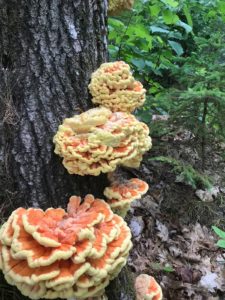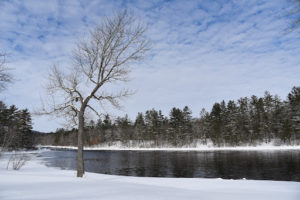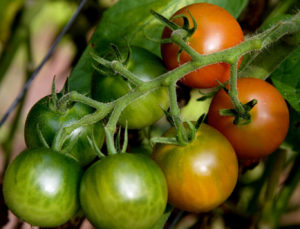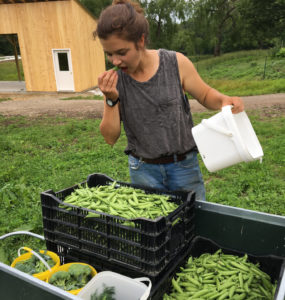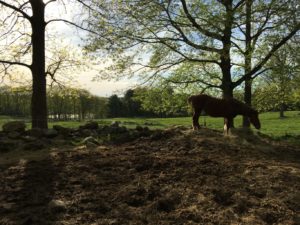In tandem with Chewonki’s Refined Sugar Awareness Week, I decided to look into how Chewonki can use natural alternatives to refined sugar in the kitchen for my Human Ecology Project. Specifically, I explored the feasibility for the kitchen to stop using refined sugar. Human ecology is the study of the relationship between humans and their surroundings. Semester students at Chewonki complete a Human Ecology Project which is a project that explores a personal connection they have to either the Maine bioregion or their home.
For my HEP, I decided to explore the use of refined sugar alternatives in the kitchen. I was inspired by one of our own kitchen staff who strives to use honey, dates, or other natural sweeteners to sweeten the food produced in the kitchen. I focused specifically on the use of maple and birch syrup made from trees on the Chewonki Neck. As stated in a previous blog post, this year the faculty and I tapped 18 maple trees on campus, producing over 4.5 gallons of syrup from 182 gallons of sap. This syrup has ended up on pancakes, bacon, and french toast and has worked its way into many tasty meals. This year for the first time on Chewonki Neck, we also tapped seven birch trees (specifically three Paper Birch and four Yellow Birch). From these trees I collected 35 gallons of sap (19 gallons paper birch and 15 gallons yellow birch) resulting in .4 gallons of syrup. The paper birch and the yellow birch had very similar flavors. The yellow birch was a bit less fruity but that may have been due to the amount of time the sap spent boiling. Both birch syrups have a rich, fruity, butterscotch flavor which Bill, our kitchen manager, helped me use to make Birch Creme Brulee.
Birch Creme Brulee:
½ cup paper birch syrup
6 egg yolks
2 ¼ cups heavy cream
birch sugar drizzle
Directions:
Combine yolks and syrup. Beat in hot cream and bake in individual dishes at 325 degrees in a water bath until barely set. Chill. Drizzle with more birch syrup.
Tapping and producing birch syrup is very similar to producing maple syrup. To put the taps in, we drilled a small hole in the trees and hammered the taps in. Sap dripped from the taps and had to be collected every one or two days. The birch trees commonly produce over a gallon each day, making carrying the sap to the freezer a very long and strenuous process. Each collection takes about 45 minutes alone. It is more laborious to make birch syrup than maple because it takes 80-90 gallons of birch sap to make 1 gallon of syrup, whereas maple only takes 40 gallons sap. Each boil takes about 5-6 hours, which includes a large outdoor boil over a wood-burning fire, and a final boil over the stove. We did six boils in total this year. Both birch and maple syrup require a lot of time and manpower to make.
After researching and making birch and maple syrup, I examined the feasibility of replacing all refined sugar in the kitchen with these local alternatives.
Unfortunately, I determined that it is not practical for Chewonki. Refined sugar is in almost every processed food, including basic staples like sunbutter, bagels, many of our gluten free-substitutes, and more. Not only would it be difficult to find replacements for these items, but it would also be extremely expensive (and require lots of extra labor!). For example, the kitchen spent about $670 last year on refined, granulated, white sugar. For comparison, if the kitchen were to replace all of this sugar with non-Chewonki, maple syrup it would cost approximately $10,630 for the year. Even if we were to use Chewonki-made maple syrup, we would have to increase our production by 31500%, tapping 5,670 trees to meet the sugar needs of the kitchen. Other options like dates and honey are similarly expensive. While a week of refined sugar free food might work, in the long run, it is not feasible for Chewonki’s kitchen to go entirely refined-sugar free if the same sugar consumption is maintained. To improve our health and the environment (see Courtney’s blog post), we can all try to reduce our sugar consumption and look to using substitute syrups and fruit sugars in place of refined sugar.
If you are interested in participating in Chewonki’s Refined Sugar Awareness week, you can take the pledge to be refined-sugar free for the week of April 21st.
-Lindsay Finn, Semester 52







